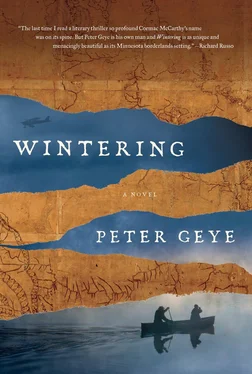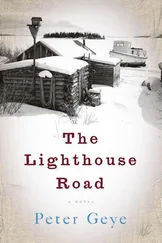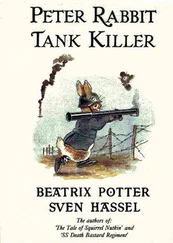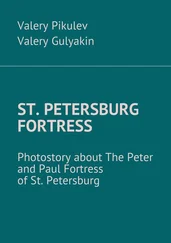I watched him there at the window and thought maybe I’d been wrong about him. Maybe that was his moment of reckoning, not that morning against the tree on the bay of that remote lake. Maybe it had taken him that long for the four directions of his compass to come together. Maybe he might now have some peace.
“Those echoes, they’re like part of my own heartbeat, Berit.”
He turned to look at me, but then closed his eyes and lowered his head.
“I kept my eyes closed, just like he told me to. Ever the obedient son.” He closed his eyes tighter still. “And then those gunshots were alive. So loud and close I felt them not only in my body but through the tree I was leaning against. They’d become part of me the second I heard them. Two shots, and for the third time on the borderlands I was dead. The third, but not the last time.”
THE FIRST LETTER was about trees. “I had begun to think that trees were not real,” she wrote her parents. “When the boat to Tromsø came through the fog and the shore was there, I saw them. I was very happy.” The rest of that first letter, dated 11 October 1895, and the next several were like a strange trip through time. They recounted in childlike detail Thea Eide’s passage to America (pregnant cabinmate, stillborn child), her landing in Gunflint (no one to meet her, wild fear), meeting Rebekah (“The saddest person you ever saw”), and her opinion of Hosea Grimm (“A nice man, even if he’s strange sometimes”). She told her mother that her sister — Thea’s aunt — had passed away tragically, and that this had rendered her uncle unfit to help upon her arrival or since. She wrote in detail about the conditions of the logging camp where she found work as a cook and spoke highly of the kind, rough men who felled the trees. On the subject of the dogs guarding the camp, she wrote a whole letter. “One I have named Freya. The top of her head comes up to my belly. Each morning and each night I bring them scraps. They are beautiful, like bears. We all feel more safe for having them.”
But the most revealing letters were the last two she wrote. The first was dated 23 April 1896.
Kjære mutter og pappa,
I am happy to tell you that I have married a man named Joshua Smith and we will be having a child. We were wed in Immanuel Lutheran Church here in Gunflint, Amerika, by Pastor Erolson. Mr. Smith is a watch seller and is eight years my senior. He is a kind man and God fearing and I am happy and lucky to have found him. We will live in town. I will send a photograph of the child and his father when he is born. I am not afraid of bearing the child. Mr. Hosea has always been kind and he will see that all is fine with me. My love to you both.
Kyss og klem—
Dine Thea Inger
I looked up. “My goodness.”
“You can say that again,” Gus said.
“What about the last letter?”
He handed it to me, translated in his sister’s elegant scrawl, and the photograph that had waited in the envelope for a century. I looked at a black-and-white snapshot worn almost to the point of invisibility, though the outline of a cherubic babe was plain to see. I stared at it long enough that there passed from one minute to the next a likeness to each of the Eide men: first Odd, then Harry, then Gus. Even Tom, Gus’s grown son. I felt a chill go up my back.
“Read the letter,” Gus said softly. “It’s the last one she sent. The last she meant to send.”
There was no date on that letter, though on the back of the photograph Odd’s birthday was written: 26 November 1896. The letter began as they all did.
Kjære mutter og pappa,
This is my son. My dear sweet son. Odd Einar, I call him. He is all mine. Pappa, I have named him for you. Maybe he will grow to be as good. He will. I am certain he will. He is so gentle. You sent me to Amerika for happiness and I have found it. He will have his own happiness someday. I only wish you could hold him, Mutter. Since you cannot, I will hold him for us both. I am well. I was brave. I remember how brave you were, Mutter. I was you. I am so happy! If I die tomorrow my only unhappiness will be that I can’t see my Odd Einar grow. I love the sound of his cry. He cries now. I must feed him. But I will write again soon. Thank you for sending me to Amerika.
Dine Thea Inger
“I didn’t think Thea Eide was ever married,” he said.
“She wasn’t.” I set the letter down among the others.
“But—” Gus picked it up and held it limply, as though offering a piece of suspect evidence in a trial whose verdict had already been decided.
“I guess she had her own stories.”
“I expect she did.” He scanned the letter again before putting it atop the others. “It was often said that my grandfather was misbegotten. Like my father after him.”
“That’s what I always heard, too.”
“From Rebekah?”
“Yes. Though she wasn’t a proper storyteller, as I’m sure you know. But she occasionally muttered something, and of course there has always been the gossip and scuttlebutt. In any case, I think what we’ve heard about your great-grandmother is true more or less.”
Gus looked at her. “But she put this differently. Why do you suppose?”
“She could hardly tell her parents the truth, could she? I imagine she needed to say something, to let them know they were grandparents, even if only from half a world away. That’s what people do when they have children, isn’t it? Spread the good news? Who else did she have to tell? Her folks were the only people she had in this world. Which means she had no one. Imagine that. How very sad.”
“What a shame those letters never reached them.”
I shook my head. “To say the least.”
“Tell me, what’s the story as you know it?”
“You could walk over to the courthouse to find half of it signed and sealed. As far as I know, Joshua Smith was the itinerant watch salesman he’s said to have been. A strange vocation, that, but of course the lumberjacks needed timepieces, each and every one of them. Smith came through the first winter she worked up at the Burnt Wood camp. A famous winter it was, for both the cold it wrought and everything that happened up in the woods.”
“The winter of 1896?”
“That’s right.”
“You know,” he said, “the Ax & Beacon compared this winter to the one we’re talking about. This is the second coldest on record—1896’s number one.”
“Exactly a hundred years apart. Did that occur to you?”
“Yes, it did.”
“Puts a nice shape on things, doesn’t it?”
“I’m not sure I thought of it that way.”
“So what did you think?” I asked.
“Not much, actually. Maybe that a hundred years isn’t such a long time. Not when it’s measured out against a place like this.”
“It’s practically the whole history of this town, though. That’s something. Even you can admit that.”
“Maybe I should’ve said measured out against a family like mine.” He looked at me. “I consider you part of the family, Berit. I would’ve said that for years, but I say it with even more conviction now.”
“That’s very kind of you.”
“And not just because of what you meant to my father.”
I saw the blush rising in his face as I felt it in my own. “Well, now,” I said, “be careful not to sweep an old lady right off her feet.”
He tucked the letters in a neat pile. “I thought they’d say more. To be honest, I thought they’d make me cry.”
“I can’t say I had any expectations, not particularly. But they certainly do break my heart a little.”
FOR THREE DAYS and three nights Gus hadn’t checked his maps. On the fourth morning, soon after they’d broken camp, the wilderness — though it hadn’t, in fact, changed at all — became a foreign land. So he took the compass from his pocket and confirmed his direction. All that day they continued south or east. He kept one eye on the woods ahead and the other on the needle of the compass in his outstretched hand, always south or east. When they crossed a river flowing down that same course, he knew they’d bridged the divide.
Читать дальше












